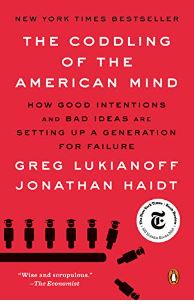Latest posts
A masterclass in creating value
What’s going on at parkrun?
Virtue-signalling all the way to the bank
Bud Light: brand purpose or virtue-signalling?
The Coddling of the American Mind, by Greg Lukianoff and Jonathan Haidt
Belonging, by Owen Eastwood
Such a simple thing
The Long Win, and The Scout Mindset
The Cult of We by Eliot Brown and Maureen Farrell
Coffee and covid modelling
By theme
Marketing strategy
Insight & metrics
Innovation & inspiration
Brand & positioning
Marketing communications
Business purpose
Leadership
By industry sector
Financial services
Retail
FMCG
Technology & start-ups
Consumer services
Business to business
Other sectors
By type
Books
Comment
Quotes
Thought leadership
When and how did we all become so emotionally fragile? One might accept that children should be protected from old-fashioned books which might teach them wrong or outmoded ideas, as per the recent furore over the revision of Roald Dahl’s classic children’s books. (Or not.) But a trigger warning for university students on Jane Austen? This book will help you trace the origins of this extreme sensitivity. Of course it comes from the USA, and of course race/ ethnicity is a key component. This, like many social trends, has crossed the Atlantic more or less intact, even though the ethnic make-up of the UK is very different, and the history of British ethnic minorities entirely different.
The subtitle, “How good intentions and bad ideas are setting up a generation for failure”, signals that most of the action in the book is in American universities and colleges. These centres of learning are supposed to nurture the expansion of knowledge and to encourage critical thinking in their students. Instead, say the authors, they are promulgating what Lukianoff and Haidt call “three Great Untruths”.
The first, in a reversal of Nietszche, is The Untruth of Fragility: What doesn’t kill you makes you weaker. Thus, students must be warned about unpleasant or disagreeable content, protected from bad stuff, and given ways out if confronted by anything that upsets them. This can be found on British campuses right now, in the form of comfort rooms for those students upset by the fact that someone with challenging views is lecturing on-site – never mind that they are not compelled to attend the lecture.
The second is the Untruth of Emotional Reasoning: Always trust your feelings. This is surely counter to the evidence-based learning that is still the norm in at least some academic disciplines. Explaining an optical illusion, for example, or the placebo effect in medicine, are not compatible with this belief. But the idea of “my truth” is, as is the increasingly common view that if something causes offence, it is either bad or wrong or both, and should be removed.
The third is the Untruth of Us versus Them: Life is a battle between good people and bad people. This leads to massive over-simplification. People who say offensive things are the bad ones. I am a good person so I will not say anything offensive. But who decides what is offensive? This leads to an ever-shrinking palette of acceptable positions, which is inimical to the exploration of ideas and the development of critical thinking.
The book explains and illustrates the Untruths, showing how they are leading to the shutting down of young minds. Instead of developing independence and resilience they are increasingly fragile. As they pass into the workplace, the same principles and expectations are seeded there. So it’s no surprise that some of the greatest virtue-signalling and narrowest minds are found in the world of publishing, where jobs are greatly sought-after by bright young graduates from top universities. This was apparent in the fuss about publishing the Ickabog, a new children’s book by JK Rowling. Many young staff at her publisher, Hachette, threatened not to work if the book was not dropped. In that instance the publisher stood strong, but it is striking that these young adults thought this a sensible career move.
US culture runs ahead of the UK, so although the book is a few years old now, it’s as relevant as ever, because this phenomenon is still growing on both sides of the pond. There are shocking stories about cancellation and censure over seemingly trivial things, like a sombrero. That’s about cultural appropriation, obviously. The academic who suggested that it was unduly sensitive to tell students not to dress up in a sombrero ultimately had to leave her job. That was despite the fact the Mexican students themselves said sombreros are seen as a bit of fun in Mexico, worn more or less as fancy dress there too.
This is an essential read, then, both to understand this cultural phenomenon, and to frighten yourself about how mad things can get (though I suspect you’re not allowed to say mad any more. Mustn’t other those with mental illness.)
Latest posts
A masterclass in creating value
What’s going on at parkrun?
Virtue-signalling all the way to the bank
Bud Light: brand purpose or virtue-signalling?
The Coddling of the American Mind, by Greg Lukianoff and Jonathan Haidt
Belonging, by Owen Eastwood
Such a simple thing
The Long Win, and The Scout Mindset
The Cult of We by Eliot Brown and Maureen Farrell
Coffee and covid modelling
By theme
Marketing strategy
Insight & metrics
Innovation & inspiration
Brand & positioning
Marketing communications
Business purpose
Leadership
By industry sector
Financial services
Retail
FMCG
Technology & start-ups
Consumer services
Business to business
Other sectors
By type
Books
Comment
Quotes
Thought leadership
